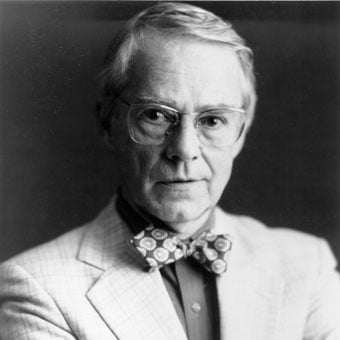
Jack Beeson
An introduction to Beeson’s music drawn from critical response
"[Jack Beeson’s] music is marked by enlightened utilitarianism: particularly forceful are his operatic compositions."
Nicolas Slonimsky in Baker’s Biographical Dictionary of Musicians, 7th ed. (New York, 1984)
"Few contemporary American composers have grappled with the problems of composing for the opera stage as long and as hard as has Jack Beeson, whose works have been staged, televised, revived, and recorded with uncommon frequency and success. Since 1950, he has composed [ten] operas that have placed him firmly in a tradition of musically eclectic, dramatically cogent, and quintessentially American opera writing that has included such earlier composers as Virgil Thomson and Douglas Moore.
With the exception of Jonah [and Cyrano], all his operas are based on American literature and history. All these works possess their own musical and dramatic styles and character and reveal a continuing fascination with and understanding of peculiarly American kinds of characters, ideas, social situations, and speech patterns.
If Beeson has tended to choose subjects close to home, his sources of musical material range far and wide. Aside from his borrowings from folk traditions, jazz, and nineteenth century opera, his operas contain certain passages modelled on expressionistic German serialism, Broadway musical tunes, and various avant-garde schools of composition. Such stylistic eclecticism is, in Beeson’s view, not only desirable but necessary in opera to sustain musical and dramatic interest. ‘Any theatrical work that is going to last for two hours ought to have some range of style,’ he says. ‘I don’t mean to imply that it must include twelve-tone passages [in] one place and conventional tonality in another; that’s up to the composer. But different kinds of characters quite naturally should sing different kinds of lines and should be accompanied by different kinds of textures and styles.’"
Duke Johns in Music Educators Journal (October 1979)
"Beeson’s operatic successes have caused his instrumental and orchestral music to be overlooked. The Symphony shows that Beeson’s symphonic craft is of the best, regardless of the modicum of eclectic significance that creeps in. Two techniques are major strengths: the expert orchestration and the polyphony. Beeson’s counterpoint sounds rather than being the oft-met receptacle for holding academic waste."
Arthur Cohn in Recorded Classical Music (New York, 1981)
